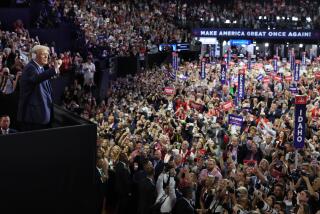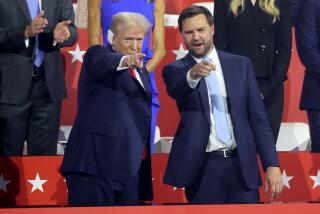Tactic Uses Pulpits to Power the GOP
WASHINGTON — Worried that discontent among conservatives and the lack of a clear standard-bearer to follow President Bush might cost Republicans in November, top evangelical leaders pleaded with their followers Friday to put aside frustrations and turn out for GOP candidates.
The appeals, coming on the opening day of a weekend-long rally and strategy conference, included entreaties to pastors to use their pulpits on behalf of the social conservative agenda.
“There is no choice, because the alternative is terrible,” said James C. Dobson, founder of the influential group Focus on the Family, referring to the potential for a Democratic takeover of the House and Senate in November.
Dobson’s organization recently launched a major voter recruitment drive in eight battleground states that will include placing registration tables outside Sunday worship services at conservative churches.
The Values Voter Summit -- which will include appearances by several potential GOP presidential hopefuls -- underscores evangelicals’ growing power in national politics. The agenda serves as a road map of their tactics for energizing voters, including sessions on fighting gay marriage, attacking Hollywood liberalism and denouncing embryonic stem-cell research.
Kicking off the conference Friday, Dobson joined other evangelical chieftains in lobbying pastors to feel more free to advocate for conservative causes from the pulpit despite recent investigations by the Internal Revenue Service into alleged partisan activities by churches. One such investigation has ensnared the liberal All Saints Church in Pasadena, over a sermon denouncing the Iraq war shortly before the 2004 election.
One session today is to focus on the “role of churches in political issues.” On Friday, Dobson and a representative from an evangelical-backed legal group told the crowd that churches were free to distribute fliers and other materials promoting stands on issues.
“You still can’t endorse candidates, but you can do voter guides,” Dobson said. “You can do all kinds of things.”
Critics say Dobson and his allies are crossing the line and giving bad advice to churches. The Rev. Barry Lynn, executive director of Americans United for Separation of Church and State, mailed letters this week to 117,000 churches in 11 states warning them not to go along with voter registration drives and other activities.
“They are talking about a systematic effort to get churches involved in political activity,” said Lynn, who attended the conference and met privately backstage with Dobson to debate the question. “They say this isn’t partisan, but then they turn around and make it clear that their goal is to keep Republicans in power.”
Friday’s events showed that evangelicals intend to broaden their focus on issues that can motivate voters. Leaders framed the GOP’s signature issue of terrorism as a matter of “protecting the family” and winning a war between Judeo-Christian traditions and Islamic extremism.
Dobson, whose radio show is heard by millions, said protecting the country from terrorism was a “family issue.”
“If we don’t have security for ourselves and for our children and future generations, we don’t have a future for the family,” he said.
The mention of terrorism was the latest indication that conservative strategists are looking for additional motivators beyond the issue of gay marriage, which was credited with helping Bush secure reelection in 2004 thanks to a series of ballot initiatives that year in key states such as Ohio. Republican strategists have acknowledged that they intend to mobilize the conservative base by painting Democrats as soft on “foreign threats,” as one internal GOP memo recently explained.
Other speakers on Friday focused on illegal immigration and called for a border crackdown, invoking an issue that has divided the GOP’s conservative core from the White House and from Capitol Hill moderates.
But Friday’s events showed that gay marriage remained a central rallying cry, with Dobson and others promoting initiatives this year in eight states.
“We see America on this collision course between religious freedoms and the homosexual agenda,” said Tony Perkins, president of the conservative Family Research Council.
Three possible presidential candidates, along with White House Press Secretary Tony Snow, were applauded when they raised the issue.
Massachusetts Gov. Mitt Romney, a likely White House contender who is viewed skeptically by many evangelical leaders because he is a Mormon and is viewed as a moderate, said the country “desperately” needed a federal gay marriage ban. He won cheers as he spoke of his opposition to a ruling by his home state’s highest court upholding same-sex marriage.
Similar themes were sounded by three other presidential possibilities: Sens. George Allen of Virginia and Sam Brownback of Kansas and Arkansas Gov. Mike Huckabee.
Allen -- whose race for reelection this year has tightened after his use of the word “macaca,” a racial slur in some countries, and his reaction to revelations that he has Jewish heritage -- was boisterously applauded when he asked the conference activists to come to Virginia and assist with that state’s initiative this year to ban gay marriage.
But though some potential Bush successors were eager to score points with the crowd, two of the party’s front-runners were noticeably absent. Neither Sen. John McCain of Arizona nor former New York Mayor Rudolph W. Giuliani are scheduled to speak -- a reminder that even as the GOP seeks to mobilize its base to maintain power, the future of the party’s leadership remains much in doubt.
More to Read
Sign up for Essential California
The most important California stories and recommendations in your inbox every morning.
You may occasionally receive promotional content from the Los Angeles Times.









